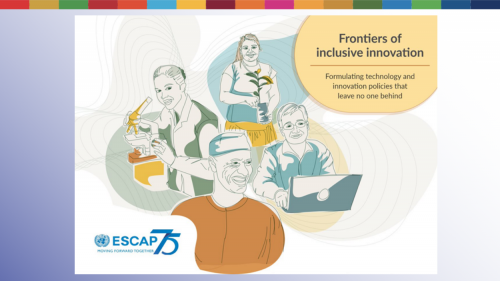
https://www.unescap.org/news/un-forum-closes-call-ensure-inclusion-heart...
High-level delegates at the Frontiers of Inclusive Policy Innovation Forum today also underscored the need to expand opportunities and ensure technology solutions are relevant, accessible, and affordable to all segments of society – especially the poorest and most disadvantaged.
“To leave no one behind and meet the ambitions of the 2030 Agenda for Sustainable Development, it is imperative to expand the frontiers of inclusive innovation. Innovators and enterprises of different sizes and sectors must be able to harness technology and innovation. The poorest populations, women and girls - in both rural and urban areas - must be able to benefit,” underscored Armida Salsiah Alisjahbana, United Nations Under-Secretary-General and Executive Secretary of ESCAP.
Innovation can expand access to education and healthcare services. Technologies, such as those supporting renewable energy, are providing options for more environmentally sustainable development paths. However, science, technology and innovation have also exacerbated inequalities and created new types of social divides and environmental hazards, establishing new and harder to cross frontiers between those that benefit and those excluded.
“We must now shift our thinking from enabling financial inclusion to supporting economic growth aimed at promoting a wider range of socially desirable outcomes, such as sustainability, equality, health and well-being, driven by technology and innovation,” said Ariff Ali, Governor of the Reserve Bank of Fiji.
“Science, technology, and innovation should be people-centered. In order to move forward with inclusive and sustainable development, we have to ensure that our actions lead to science-based solutions that address the challenges of the vulnerable sectors. This can be done through targeted initiatives in improving agriculture, health, industry, energy, and other areas using technology and innovations,” said Fortunato T. de la Peña, Secretary of Science and Technology, Department of Science and Technology of the Philippines.
The Forum further recommended five avenues for action in the region: (i) Utilizing a whole of government approach for greater inclusive innovation impact; (ii) Adopting decentralized community-centered approaches to promote innovation policies; (iii) Uncovering channels to reach people at the margins; (iv) Leveraging the private sector for inclusive innovation; and (v) Making use of innovative financing mechanisms.
The event concluded a six-part series of policy discussions hosted by the United Nations Economic and Social Commission for Asia and the Pacific (ESCAP), in collaboration with Digital Pathways at Oxford University, the Honey Bee Network, the Gujarat Grassroots Innovation Augmentation Network and the Inclusive Business Action Network (iBAN).
The series also presented findings from the recently published Frontiers of Inclusive Innovation report. The report highlights the opportunities and challenges faced by policymakers and development partners, and provides concrete examples of how governments are promoting more inclusive innovation policies across Asia and the Pacific.
Since 2018, ESCAP’s programme on promoting inclusive technology and innovation policies has successfully supported inclusive STI policies in Cambodia and Myanmar, an inclusive national digital development strategy in Mongolia, grassroots innovation initiatives in India, Malaysia and the Philippines, and inclusive business policies in ASEAN.










Add new comment